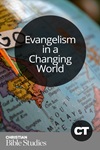Rick Richardson has written a book called Reimagining Evangelism. He suggests that we imagine the evangelist as a travel guide and define evangelism as conversations with people on a spiritual journey, which will lead to shifts in our pictures and practices at every point. Here are the ideas he explores in this book.
Collaboration versus activism. Most of us get tired just thinking about evangelism. Our old model directs us to share the good news with everybody all the time, whether we know them well or not and whether spiritual conversation is appropriate or not. We must build friendships, talk to strangers, study the Bible with unchurched people, share the gospel, call them to Christ and then follow up. Don't you just get tired reading that list, let alone thinking about doing it? And yet we feel like anything less falls short.
What if we rediscovered the role and reality of the Holy Spirit? What if we saw ourselves as collaborators rather than activists, looking for clues about where God is already at work, expecting God to nudge us, being in an attitude of prayer whenever we were with unchurched people? Evangelism could become an adventure in detection rather than a burden of making it all happen.
Community versus individual. God is far more committed to raising up witnessing communities than to raising up witnessing individuals. Our sales model leads us to think of individual salespeople fanning out across the landscape, going door to door and person to person. Though individual witness is certainly important, the Holy Spirit fills a Christian community and uses the community as a body in witness. Each member has its own particular contribution to make, according to the gifts each person has been given. More important than each of us doing the same thing to witness to others, we each must do our particular part. Then our witness together will be much greater than the sum of our parts.
Further, today people come to Christ primarily in the context of community. Belonging comes before believing. Evangelism is about helping people belong so that they can come to believe. So our communities need to be places where people can connect before they have to commit.
Friendship versus agenda. Our old model focuses on the agenda—downloading our content and closing our deal. We easily assume that if we haven't shared the whole ball of wax and challenged people to commit their lives, we haven't done evangelism. But the model of conversations with spiritual friends delights in the relationship itself and rejoices over every spiritual conversation.
Story versus dogma. Our old picture focuses on certain truths or beliefs we are to communicate. The sin of humanity, the judgment of God and the sacrifice of Christ as he takes the just judgment of God on the cross in our place are some of the primary truths we are to communicate. If we haven't communicated those particular truths, we feel we haven't evangelized. The new model doesn't lose those truths but realizes we don't start there. People today are much more concerned about an experiential reality of God than about dogmas and beliefs. Whenever we have been able to tell a story about God's reality, then we have had good spiritual conversation. We have evangelized!
The outside-the-box Jesus versus the cliché Jesus. People in our culture think they know what Jesus is about. And many are intrigued by Jesus, but they don't want to talk about Jesus with church types. Church types seem to have Jesus in a box and talk about Jesus in very uninteresting ways. Our old model emphasizes bringing up Jesus and the benefits of Jesus whenever possible. And so the recipients of this sales approach never know when Jesus might pop up. It might be anytime, but they always know what he will look like. He's kind and good, saves you, fulfills you, and is the answer to any question you might have, and lots of questions you don't have.
The new model brings up Jesus naturally and in non-cliché ways. Jesus surprises people not by popping out at every moment but by looking very different from what was expected when he does appear.
Good news about God's kingdom versus good news about the afterlife. The old model emphasized how we could be forgiven of our sins and go to heaven after we die. But actually that wasn't Jesus' focus, though it was part of his message. Jesus' main message was that the kingdom or rule of God is at hand. The rule of God is the act of God to set things right and to make people and the world work as they were intended to work. So Jesus talked much more about this life than about the next, much more about changing this world than about giving us a free pass to the next.
Journey versus event. Our model of conversion has pushed us to draw lines in order to figure out who's in and who's out, and we look for a one-time event, a decision, that distinguishes people on the outside from those on the inside. I don't know about you, but for me this constant attempt to figure out who has become a Christian and who's in and who's out has been a very frustrating and fruitless experience. The new model, a model based on the image of journey, sees all of us as moving either toward the goal or away from the goal. If the goal is to be a wholehearted follower of Jesus, then we are at different points along the way. But the crucial question is whether we are moving toward the center and beginning to follow in the footsteps of the Leader.
We need to explore these shifts, see if Scripture backs them up, look honestly at barriers and brainstorms to help us pursue the new model, and end with some practical skills that can get us ready for the challenges that will face us on the spiritual friendship adventure.
Through each of these explorations, we must look to the Holy Spirit to teach us and lead us. After all, the Holy Spirit is the true witness to Jesus. The Holy Spirit has been pursuing conversations with people he loves on a spiritual journey for the past two millennia. The Holy Spirit has much to teach us if we will listen and learn.
A final word: Although the sales model is the box people of our culture have most commonly put evangelism in, the relational evangelism model can itself be a box. We can build trust and friendship with people but never get to the point of challenge. People are not loved when we build trust but never communicate truth. So the new model, the new ways of communicating and connecting, must transcend the relational evangelism box just as much as they transcend the sales box. We need a fresh wind of the Spirit, and new ways to connect and communicate, so that God can set his people free for transformational witness. Even the emphasis on friendship, though healthy and wise can hold us back. We can learn to look to the Holy Spirit, build trust, and share ourselves and our faith authentically with others, whether we have just met them or known them for years.
Reimagining evangelism can help set us free for authentic and Spirit-empowered witness. But risk is inescapable. If we are looking for risk-free evangelism, we will never influence people toward Christ.
So are you ready for the adventure of spiritual companionship, conversation and challenge? Are you ready to share what wisdom and experience you have with others? If so, let's go!
—Adapted from Reimagining Evangelism by Rick Richardson, InterVarsity Press, Copyright © 2006. Used with permission.












